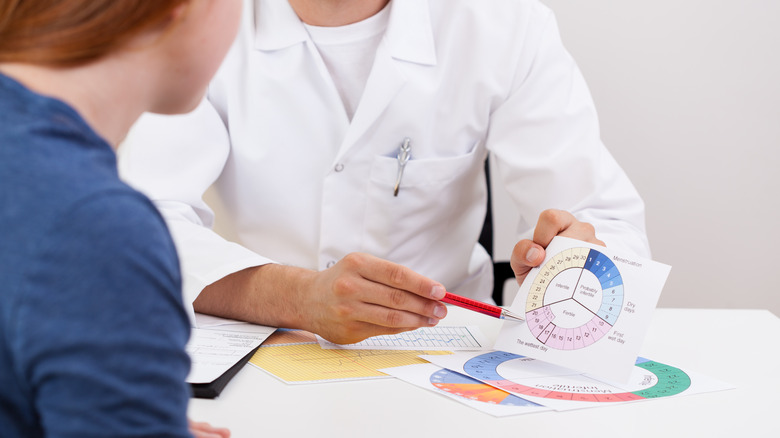What It Means When Your Menstrual Cycle Gets Shorter
We often think of a menstrual cycle as lasting exactly one month — but that's not true for everyone. No matter the length, cycles can range from erratic to by-the-clock. If yours have been pretty predictable in the past, getting your period sooner than expected can feel surprising and even upsetting. What does it really mean when your menstrual cycle gets shorter, and what does it say about your health?
"Normal" menstrual cycles will mean something different for each person, says the Mayo Clinic. Menstrual flow usually lasts between 2-7 days and can range from completely pain-free, light, and short, to incredibly painful, heavy, and long. Cycles typically last anywhere from 21-35 days, and this length can be regular or irregular. As you get closer to menopause, which happens around age 51, cycles may become more irregular.
There are 4 phases of the menstrual cycle (via Healthline). First, there's the menstrual phase, when the uterine lining sheds and you bleed, followed by the follicular phase, when the eggs in the ovaries begin to mature. An egg is released in the ovulatory phase, and the luteal phase ends the cycle as hormones begin to drop.
How ovulation affects your menstrual cycle
While we might think that a shorter menstrual cycle has to do with our periods, it often has to do with ovulation (via MindBodyGreen). When ovulation occurs, the follicle the egg was released from produces progesterone, which prepares the uterine lining for implantation of a fertilized egg. If that doesn't happen and pregnancy doesn't occur, the follicle dies and progesterone levels begin to drop, eventually leading to your period. If ovulation is poor and there's not enough progesterone being produced, your period may come early.
"Anything that leads to poor ovulation will lead to less progesterone, and you will get your period sooner," Dr. Mary Jane Minkin, clinical professor of obstetrics and gynecology and reproductive sciences at Yale Medical School, told MindBodyGreen. This can often happen as you age, after you have a baby, or if you're breastfeeding.
You can support ovulation by reducing stress levels, using natural progesterone products, increasing your intake of vitamin B6 and zinc, supplementing with herbs like chasteberry, getting good sleep, and maintaining a healthy weight (via MedicalNewsToday). Tracking your cycle is also a helpful tool for staying aware of any menstrual changes or concerns.


